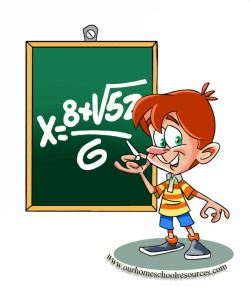Homeschool Math Curriculum for 1st Grade
This page provides you with a sample homeschool math curriculum for 1st grade kids. It is divided into weeks. You can adjust it according to your needs...
Week 1-2: Numbers 1-50
- Recognize and write numbers 1-50.
- Count forwards and backwards.
- Introduction to even and odd numbers.
Week 3-4: Basic Addition and Subtraction
- Add and subtract within 10.
- Introduce word problems for addition and subtraction.
- Use objects and drawings to solve problems.
Week 5-6: Numbers 51-100
- Recognize and write numbers 51-100.
- Understand the concept of tens and ones.
- Place value introduction.
Week 7-8: Addition and Subtraction Within 20
- Add and subtract numbers up to 20.
- Strategies like counting on making a ten.
- More word problems.
Week 9-10: Basic Geometry: Shapes and Patterns
- Recognize and classify shapes (both 2D and 3D).
- Understand attributes of shapes (sides, vertices).
- Continue and create patterns using shapes.
Week 11-12: Comparing and Ordering Numbers
- Understanding greater than, less than, equal to.
- Ordering numbers from least to greatest.
- Introduction to the number line.
Week 13-14: Introduction to Measurement
- Measure length using non-standard units (like paper clips or blocks).
- Compare lengths of different objects.
Week 15-16: Data and Graphing
- Collect data and record using tally marks.
- Create and interpret simple bar graphs and pictographs.
Week 17-18: Money and Time
- Recognize and know the value of coins (penny, nickel, dime, quarter).
- Basic time-telling (whole hours and half-hours) on analog clocks.
Week 19-20: Addition and Subtraction Within 50
- Adding and subtracting multiples of 10.
- Strategies for mental math.
- Word problems.
Week 21-22: Advanced Geometry: Halves and Fourths
- Recognize halves, fourths, and quarters.
- Understand that dividing shapes into more pieces makes each piece smaller.
Week 23-24: Place Value (Tens and Ones)
- Recognize, for instance, that 29 has two tens and nine ones.
- Addition and subtraction from 1-100 using place value knowledge.
Week 25-26: Time Continued
- Telling time to the quarter-hour.
- Introduction to calendars: days, weeks, months.
Week 27-28: Advanced Measurement
- Introduce standard units like inches and centimeters.
- Estimate lengths and then measure.
Week 29-30: Advanced Money Concepts
- Combine different coins to make the same amount (e.g., a nickel is the same as five pennies).
- Simple money word problems.
Week 31-32: Problem Solving and Critical Thinking
- More complex word problems.
- Using multiple math skills to solve a problem.
Week 33-34: Review and Deepen Concepts
- Revisit challenging topics.
- Deepen understanding through varied problems.
Week 35: Math in the Real World
- Apply math skills to practical tasks: baking (measurement), shopping (money), etc.
Week 36: Assess and Celebrate
- Informal assessment of the year's concepts.
- Celebrate growth and achievements with math games and activities.
Supplementing the curriculum with math-based puzzles, online math games, and hands-on activities can further enhance understanding. You may adjust the curriculum according to the child's pace, strengths, and needs.

What's in our homeschool...
Finding the right homeschooling curriculum that best fits my children's needs was one of the most significant challenges I had when we first started our journey. I found different curricula that best suit my children's needs...
As a parent, a homeschooled reading curriculum was at the top of my mind when we started homeschooling. English was one of the requirements in our state, and what better way to learn English than to read. Getting kids interested...
There are various homeschool math curricula that you can use in your homeschooling. As for me, I use Mathletics and Khan Academy for my children. They are beneficial for us. I use Mathletics for our homeschool math ...
A homeschool art curriculum has a lot of benefits to children. This includes the development of language and communication skills, dexterity, motor skills, creativity, focus, persistence, problem-solving skills, collaboration...
Our homeschool science curriculum includes a few different things. Science is really a wonderful thing to be studied and explored. When we introduce our children to various opportunities for science learning, they will experience...



